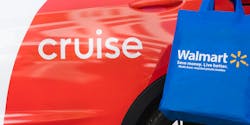Walmart Invests in Cruise Autonomous Vehicles for Delivery
Walmart, Inc., announced April 19 that it would make an investment of an unspecified amount in General Motor Co.’s autonomous-vehicle brand Cruise. In a statement, Walmart U.S. CEO John Furner said his company was “impressed” by the brand’s all-electric technology and differentiated business model after a pilot program in Scottsdale, Arizona.
“As delivery has become a staple in our customers’ lives, we’re focused on growing our last mile ecosystem in a way that’s beneficial for everyone,” said Furner, and said Cruise would help Walmart achieve its corporate goal of reaching zero emissions by 2040.
Walmart is not the only latest retailer lately to invest in an all-electric delivery vehicle brand. Amazon, the second-largest private employer in the United States behind Walmart, has invested in and agreed to purchase 100,000 electric delivery trucks from Rivian, a startup founded in 2009. USPS has invested in the U.K.-based EV firm Arrival. And in January, General Motors launched a new all-electric brand, Brightdrop, specifically dedicated to delivery vehicles and products powered by GM’s proprietary Ultium battery platform, and said it was partnering with FedEx for a trial program.
But Walmart’s push isn’t just for electric vehicles, but also for self-driving ones. Cruise does use battery-electric vehicles, but as a business it is oriented strongly towards developing autonomous-vehicle technology. Walmart, which also launched a pilot autonomous delivery service with self-driving car company Gatik, will join Microsoft and Honda as notable investors in the Cruise business.
“This investment … shows our commitment to bringing the benefit of self-driving cars to our customers and business,” said Furner. “We’re excited to join Cruise’s already impressive partner and investor ecosystem with the likes of GM, Honda and Microsoft as we work toward pioneering this emerging technology.”
About the Author
IW Staff
Find contact information for the IndustryWeek staff: Contact IndustryWeek
